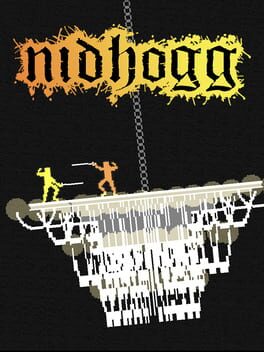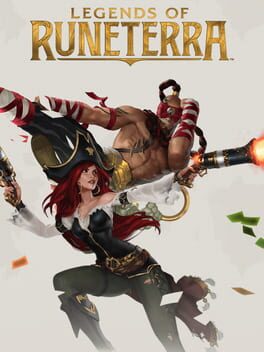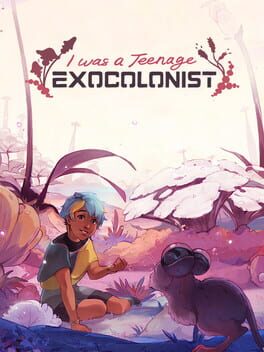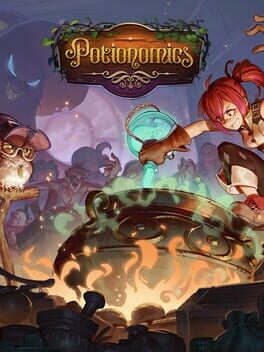mabowo
12 reviews liked by mabowo
Balatro
2024
Perfectly presented and finely tuned to be intensely satisfying with meaningful and sometimes mind-straining choices to be made. If I have any complaint, it's only that the given jokers unlocked near the beginning don't allow quite as interesting of game breaks as I'd prefer. I'm not the kind of person to beat this with every different deck in a million different ways and likely won't put in that many hours unless greater and more dynamic challenges come along so if the later unlocks do this more I'll have no way of knowing, but in this kind of game I am most interested in banging different mechanics together and seeing how the game interprets the combinations and attempts to still look like a functioning video game while you break it in every way you can possibly think of. There are of course ways to break the game and there have been people putting up absurd point totals since the beta, but I rarely get that "holy shit, THAT works??" feeling I love to get in a game like Isaac. That's not really a failing of Balatro, though, it's probably mostly a limitation of a straightforward number crunching game where it's really hard to let things break in a way that's more interesting than a number going higher than you'd expect.
Seeing the minority of negative reviews here saying it's no better than actual gambling games or exploitative mobile apps has been really eye-opening for me. I thought we always agreed the tactics those use were terrible for ruining lives and emptying bank accounts, but it turns out for a significant portion of people (even those whose opinions I'm otherwise interested in), it was a simple aesthetic distaste for animations, sound effects, and gameplay loops intended to light up your brain at a base level rather than reaching for more Intellectual pleasures. It's a repeat of Vampire Survivors: no matter how safe of an environment the design principles are used within, no matter the richness of everything else that makes up the experience (and make no mistake, this is much deeper than VS ever was), they see some sort of threat or great evil in the simple pleasures of a digital toy that contains the ruffling sounds of card pack foil or a flashing light or two.
If you ask me, this attitude is elitist nonsense masquerading as concern for the vulnerable.
Seeing the minority of negative reviews here saying it's no better than actual gambling games or exploitative mobile apps has been really eye-opening for me. I thought we always agreed the tactics those use were terrible for ruining lives and emptying bank accounts, but it turns out for a significant portion of people (even those whose opinions I'm otherwise interested in), it was a simple aesthetic distaste for animations, sound effects, and gameplay loops intended to light up your brain at a base level rather than reaching for more Intellectual pleasures. It's a repeat of Vampire Survivors: no matter how safe of an environment the design principles are used within, no matter the richness of everything else that makes up the experience (and make no mistake, this is much deeper than VS ever was), they see some sort of threat or great evil in the simple pleasures of a digital toy that contains the ruffling sounds of card pack foil or a flashing light or two.
If you ask me, this attitude is elitist nonsense masquerading as concern for the vulnerable.
Nidhogg
2014
I and the person I love most are nearly perfectly matched in this and it's brought some of the most raw, unfiltered joy I've experienced playing a video game. There's so much room for natural discovery and the actions are so dead-simple that you cut right through to the multilayered rock paper scissors and personal metagaming that make traditional fighting games so satisfying in their best moments. The levels pulsate and warp and sway in the most hypnotic ways and you're locked together running back and forth and back and forth in a dance that seems to never end and you are wholly consumed by the game and the person you're sharing it with and you approach that kind of momentary inner quiet you thought you'd never have again even as you're involuntarily shouting from impaling yourself again by diving in when your opponent was just standing still.
I'm 100% sure if I go out and look for it I'll find strategies, tech, and optimization which take away from that feeling of discovery and replace it with a tighter grasp on the mechanics bringing you and the opponent closer in a different way, but I'm not gonna let the optimization virus get this one unless I work my way there myself. There's something to be said for the maximum-information environment that is the default for any game nowadays, but there's also something beautiful about the high speed improv of a low information closed system of two players who don't have any idea how other people play it.
Ask yourself: in the past 15 or so years, how many times have you had the opportunity to feel like a multiplayer game is something between you and the people close to you, not really knowing or caring how others play it or what the "right" way to do it is?
I'm 100% sure if I go out and look for it I'll find strategies, tech, and optimization which take away from that feeling of discovery and replace it with a tighter grasp on the mechanics bringing you and the opponent closer in a different way, but I'm not gonna let the optimization virus get this one unless I work my way there myself. There's something to be said for the maximum-information environment that is the default for any game nowadays, but there's also something beautiful about the high speed improv of a low information closed system of two players who don't have any idea how other people play it.
Ask yourself: in the past 15 or so years, how many times have you had the opportunity to feel like a multiplayer game is something between you and the people close to you, not really knowing or caring how others play it or what the "right" way to do it is?
Lies of P
2023
This review contains spoilers
the entire vibe of this game feels super predatory. it's Pinocchio, but with the graceless, on-the-nose mall goth writing of American McGee's Alice. wrap it up in Yharnam's discarded skin, and you have Lies of P.
surely round8 studios is aware that Bloodborne fanatics are thirsty for even the tiniest scrap of content, how they're willing to work themselves into a frenzy over the most baseless rumor of a remaster or a sequel, yes? if this sounds like you, be very aware: if you're looking for more soulslike combat, sure, there's some worth here, but you won't find an ounce of subtlety, artistry, or narrative sophistication inside. or, to be more brief: it's fucking lame
the game's final scene features a character droning listlessly into a telephone that "they've found their next key.... DOROTHY!" followed by a jump cut to a girl in red shoes walking off of a train and clicking her heels together. cut to black, credits.
a lot has been said about the phrase "i can't" as a memetic device meant to describe the only communication style left to frappucino-sucking white ladies but, like, when my eyes rolled out of my head after viewing the game's ending and that was the only language left to me, i think i sympathize. i can't. i couldn't. fuck this.
surely round8 studios is aware that Bloodborne fanatics are thirsty for even the tiniest scrap of content, how they're willing to work themselves into a frenzy over the most baseless rumor of a remaster or a sequel, yes? if this sounds like you, be very aware: if you're looking for more soulslike combat, sure, there's some worth here, but you won't find an ounce of subtlety, artistry, or narrative sophistication inside. or, to be more brief: it's fucking lame
the game's final scene features a character droning listlessly into a telephone that "they've found their next key.... DOROTHY!" followed by a jump cut to a girl in red shoes walking off of a train and clicking her heels together. cut to black, credits.
a lot has been said about the phrase "i can't" as a memetic device meant to describe the only communication style left to frappucino-sucking white ladies but, like, when my eyes rolled out of my head after viewing the game's ending and that was the only language left to me, i think i sympathize. i can't. i couldn't. fuck this.
Super Auto Pets
2021
Wonderful to pop onto now and then and get my brain just activated enough thinking about synergies and how to pivot between different strong combinations to let the time pass without feeling a strong compulsion to play a ton. I'm not very good, but the extreme depth is evident and if I ever felt like it I'm sure I could get really into improving my skills. There's a special kind of richness to rolling with the punches of RNG or exerting your will over it that is very enticing to the TCG player part of my brain.
You piece.
You piece.
Legends of Runeterra
2020
Burying a roguelite deckbuilder into a competitive ccg as its card unlock system is so endlessly brilliant that it just makes me wish it was done everywhere. Can you imagine a Magic-based one? I'd never do anything else. Anyway, this is the best refinement of the traditional tcg into a streamlined online game I've yet seen. It's overflowing with both fresh ideas and subtly different spins on genre staples that make it feel both intimately familiar and endlessly exciting as you take in all the new possibilities.
I've been away from my main pc for a couple months now and so the vast majority of my gaming time has just gone to card games. This and now Marvel Snap have become My Games lately, and I'm having a damn good time. Don't let the League of Legends setting push you away...I'm certainly no fan of that or of anything else Riot has done, but somehow they nailed this one, even down to the monetization being the fairest of any of its competitors. Like, you technically CAN just buy cards, but for the most part you'd be a fool to do so. Just ladder and play path of champions and you'll be building meta decks in no time.
I've been away from my main pc for a couple months now and so the vast majority of my gaming time has just gone to card games. This and now Marvel Snap have become My Games lately, and I'm having a damn good time. Don't let the League of Legends setting push you away...I'm certainly no fan of that or of anything else Riot has done, but somehow they nailed this one, even down to the monetization being the fairest of any of its competitors. Like, you technically CAN just buy cards, but for the most part you'd be a fool to do so. Just ladder and play path of champions and you'll be building meta decks in no time.
A game that could very easily have fallen into any number of pitfalls in the messages it tried to convey or they ways it tried to convey them, but deftly dodges every one. A game about numbers and systems and relationship values that is steadfastly against the idea of gamifying life and relationships, that asks us to value each other and the in-between moments of life.
On my good days, I’m here. On my bad days, I’m still here.
Losing parts of ourselves and our identities are as essential to the experience of living as growing them is. Individuals can only do so much but they can still be so much for each other, and that’s worth as much as anything else. In a world where there is no ultimate victory for ideology or faction, where there is no intrinsic value in any one outcome that is ultimately worth more than any other, we’re still gonna find ourselves in each other.
I’m still here.
On my good days, I’m here. On my bad days, I’m still here.
Losing parts of ourselves and our identities are as essential to the experience of living as growing them is. Individuals can only do so much but they can still be so much for each other, and that’s worth as much as anything else. In a world where there is no ultimate victory for ideology or faction, where there is no intrinsic value in any one outcome that is ultimately worth more than any other, we’re still gonna find ourselves in each other.
I’m still here.
Inscryption
2021
Inscryption goes through so much effort to present the argument between flavorful design and mechanical purity, and does an exceptionally good job at convincing you that the former has more soul, is more compelling, and often leads to better mechanical design in the first place. After all, the first third which stands in for flavor, pomp, and presentation also ends up having the most satisfying and rewarding mechanics.
The middle third is a bit of a slog as it contains the most rigid and low-powered tcg gameplay, but I have a hard time even holding that against the game. When something impacts you deep enough, in-the-moment flaws like that become irrelevant. I think Leshy understood that.
I think Inscryption is the highest effort defense of the Kamigawa block I've ever seen.
-
Played on Linux through Proton. Will keep posting this until there's an option to choose.
The middle third is a bit of a slog as it contains the most rigid and low-powered tcg gameplay, but I have a hard time even holding that against the game. When something impacts you deep enough, in-the-moment flaws like that become irrelevant. I think Leshy understood that.
I think Inscryption is the highest effort defense of the Kamigawa block I've ever seen.
-
Played on Linux through Proton. Will keep posting this until there's an option to choose.
Victoria 3
2022
The appeal here is pretty different from what typically is involved in grand strategy. This isn’t a game of conquest or necessarily even of alt history (the national flavor here is lacking on launch, though I suspect this will be addressed over time), it’s very squarely a game about keeping a well-oiled economic machine running as efficiently as you can manage, with world events being interesting wrenches thrown in that plan you have to work around via managing different interest groups and the political coalitions they form. Like Vicky 2, the game is very concerned about pops and keeping them well cared for and happy. This is a game that wants you to do the best you can for many different people with many different interests, and I love it for that. When you're looking through the needs of each pop trying to figure out why they're struggling and what they need to live better lives, it sometimes puts you in this benevolent / parental god mindset, not unlike ActRaiser. The difference being that to actually help people and make them happier, you need to pursue economic prosperity and justice. You have to push through these rapidfire stages of history in order to please them, and I love that. In doing so, you get to really FEEL the way that early industrial economies built on top of themselves again and again, culminating in this fantastic lategame economic explosion finally giving your brain everything you spent hours training it to yearn for. I love it.
Much has been improved with regard to the portrayal of non-industrial and decentralized societies compared to Vicky 2, though I pretty much just echo the sentiments here: https://acoup.blog/2022/10/24/miscellanea-victoria-iii-confirmed-first-impressions/
In the future I’d like to play harder difficulties, because my main complaint so far is that it hasn’t really forced me to engage with the more involved systems as much as I’d like, though that does improve in the lategame. A lot of the negative reaction aside from the typical concerns about Paradox’s business model and “grr sjws grr no war micro” comes down to the fact that in many nations you can bypass a lot of the more complex stuff and just build things the game says will be profitable. With more aggressive AI settings and playing more difficult nations, I think I’ll get into that more.
I love this game. I understand the complaints about it being somewhat barebones, I really do. I don't like modern Paradox's business model either, but the truth is I already love what's here and have gotten a lot out of it. I suggest piracy with all games, but especially Paradox ones. I have a legal copy myself, but if the idea of keeping up with the wave of expansions that are sure to come sounds like it'll be too much for you, please just grab a torrent and enjoy what's here without the baggage of wondering if it was worth your money.
Much has been improved with regard to the portrayal of non-industrial and decentralized societies compared to Vicky 2, though I pretty much just echo the sentiments here: https://acoup.blog/2022/10/24/miscellanea-victoria-iii-confirmed-first-impressions/
In the future I’d like to play harder difficulties, because my main complaint so far is that it hasn’t really forced me to engage with the more involved systems as much as I’d like, though that does improve in the lategame. A lot of the negative reaction aside from the typical concerns about Paradox’s business model and “grr sjws grr no war micro” comes down to the fact that in many nations you can bypass a lot of the more complex stuff and just build things the game says will be profitable. With more aggressive AI settings and playing more difficult nations, I think I’ll get into that more.
I love this game. I understand the complaints about it being somewhat barebones, I really do. I don't like modern Paradox's business model either, but the truth is I already love what's here and have gotten a lot out of it. I suggest piracy with all games, but especially Paradox ones. I have a legal copy myself, but if the idea of keeping up with the wave of expansions that are sure to come sounds like it'll be too much for you, please just grab a torrent and enjoy what's here without the baggage of wondering if it was worth your money.
Potionomics
2022
Potionomics has to be the most original and interesting game I played all year. The DNA of Potionomics blends different gameplay genres and aspects together. It's a deckbuilder, visual novel, alchemy/potion creator, lite-RPG, shopkeeping simulator hybrid. Not every aspect is super deep, but everything that is present feels fleshed out and works very well.
Gameplay loop has you play as potion-maker Sylvia, who runs a shop specializing in selling potions. Potion selling is played out like a deck-building game, where cards are played to haggle the price of your potions to earn more gold. Instead of dying and getting a game over, customers have patience which counts down and if it reaches zero before closing the deal, they walk away without you making the potion sale. Time limits are present like the earlier Atelier games, where going to shops, visiting friends and brewing potions takes up parts of the day. As the days progress, the game introduces you to new friends providing various services such as ingredients, the ability to increase potion prices, better equipment for brewing and selling potions, etc. Some companions can even be sent out to locations, which will result in more and sometimes rarer ingredients, depending on how far they go in their expeditions with whatever potions you equip them with. You can even hang out with friends, give them gifts, and level them up, which will provide you with more cards to strategize your deck along with discounts when buying items.
Every 10 in-game days, a competition takes place and on the first calendar day, you are given 3 potions to create for the competition. Competitions play out in the same fashion as the potion selling deck-building battles, except the difficulty is increased. Played out in a “Best 2 out of 3 Rounds” format, if your potion is of higher quality and value than the opponent, you win that round automatically. If it is not, you will enter a deck-building battle and have to haggle the price up in order to win the competition.
As far as negatives go, this is not an easy game. Completion took 13 hours and 45 minutes according to my in-game save file, but my Steam profile has an 18 hour and 50 minute playtime due to me having to restart the game after a pre-update, difficult first competition boss battle. It may seem more chill with the colorful, cutesy graphics and orchestral musical score, but the time limit aspect along with the high difficulty at the start of the game means a lot of planning, time management, and attention to detail is needed when playing Potionomics. Stress is also a factor that comes into play during battles, where some customers and even competition bosses will debuff Sylvia and decrease her chances of raising interest when selling potions. Things do get much more manageable after the first two competitions as some updates have ironed out a few issues, but the management aspect still requires attention. Potionomics looks gorgeous visually and even runs perfectly fine, though some of the animations could have been smoother. Dialogue is great as are the Disney-looking cutscenes, but with everything being through text, I kept wishing there were actual voices like most modern-day visual novels. Once you complete the game, there is no New Game+ or option to continue playing. The only option is to start a new game or load a previous save. Fortunately, the game autosaves after every day, making it easy to jump back in at any point in game time. That last point could change in a future patch or update, but this still stands.
Potionomics is a great, unique hybrid of games that is worth playing for anyone wanting a different spin on visual novels, deckbuilding and potion/alchemy brewing.
Gameplay loop has you play as potion-maker Sylvia, who runs a shop specializing in selling potions. Potion selling is played out like a deck-building game, where cards are played to haggle the price of your potions to earn more gold. Instead of dying and getting a game over, customers have patience which counts down and if it reaches zero before closing the deal, they walk away without you making the potion sale. Time limits are present like the earlier Atelier games, where going to shops, visiting friends and brewing potions takes up parts of the day. As the days progress, the game introduces you to new friends providing various services such as ingredients, the ability to increase potion prices, better equipment for brewing and selling potions, etc. Some companions can even be sent out to locations, which will result in more and sometimes rarer ingredients, depending on how far they go in their expeditions with whatever potions you equip them with. You can even hang out with friends, give them gifts, and level them up, which will provide you with more cards to strategize your deck along with discounts when buying items.
Every 10 in-game days, a competition takes place and on the first calendar day, you are given 3 potions to create for the competition. Competitions play out in the same fashion as the potion selling deck-building battles, except the difficulty is increased. Played out in a “Best 2 out of 3 Rounds” format, if your potion is of higher quality and value than the opponent, you win that round automatically. If it is not, you will enter a deck-building battle and have to haggle the price up in order to win the competition.
As far as negatives go, this is not an easy game. Completion took 13 hours and 45 minutes according to my in-game save file, but my Steam profile has an 18 hour and 50 minute playtime due to me having to restart the game after a pre-update, difficult first competition boss battle. It may seem more chill with the colorful, cutesy graphics and orchestral musical score, but the time limit aspect along with the high difficulty at the start of the game means a lot of planning, time management, and attention to detail is needed when playing Potionomics. Stress is also a factor that comes into play during battles, where some customers and even competition bosses will debuff Sylvia and decrease her chances of raising interest when selling potions. Things do get much more manageable after the first two competitions as some updates have ironed out a few issues, but the management aspect still requires attention. Potionomics looks gorgeous visually and even runs perfectly fine, though some of the animations could have been smoother. Dialogue is great as are the Disney-looking cutscenes, but with everything being through text, I kept wishing there were actual voices like most modern-day visual novels. Once you complete the game, there is no New Game+ or option to continue playing. The only option is to start a new game or load a previous save. Fortunately, the game autosaves after every day, making it easy to jump back in at any point in game time. That last point could change in a future patch or update, but this still stands.
Potionomics is a great, unique hybrid of games that is worth playing for anyone wanting a different spin on visual novels, deckbuilding and potion/alchemy brewing.









